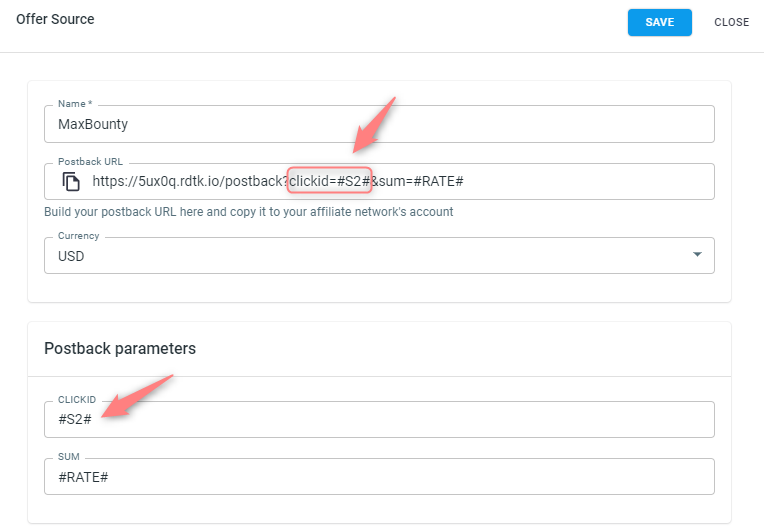Parameters/UTMs
URL syntax
Uniform Resource Locator (URL or web address) refers to a web resource that specifies its location on a computer network and a mechanism for retrieving it.
The general form of this syntax is as follows: <protocol>://<hostname>/<pathname>?<query>
Elements of this syntax explained:
<protocol> Hypertext Transfer Protocol, which can be https (secured) or http (not secured)
<hostname> An Internet host. RedTrack.io provided the service domain something.rdtk.io for that purpose. Usually, it is changed to a custom tracking domain for your tracking links.
<pathname> A resource location path. This is usually a full directory path.
<query> An optional query or other information to be passed to the server when the resource is accessed.
These macros should be united with “=”. If there are several parameters, they need to be separated with the “&” symbol: sub1={affsub1}&country={country}. It is not an obligatory parameter and can be skipped if its usage is not required.
The scheme below illustrates this common syntax and its elements using an example of the https URL:

<hash> – placeholders for unique parameters.

RedTrack supported parameters
A dynamic parameter is something that is dynamically replaced with real value during the tracking process. A dynamic parameter is also known as a variable, token, macro, or dynamic variable.
General parameters
These are the parameters you can use for your own purpose for a traffic channel, affiliate network, or a Lander the way you need it:
| Parameter | Description |
| {os} | OS Macro |
| {browser} | Browser Macro |
| {sourceid} | TrafficSource ID |
| {country} | Country Macro |
| {city} | City Macro |
| {lpkeyua} | LP Key Macro |
| {campaignid} | CampaignID Macro |
| {isp} | ISP Macro |
| {region} | Region |
| {ip} | IP address |
| {useragent} | User agent |
| {brand} | Device brand |
| {model} | Device model |
| {prelanderid} | Prelander ID |
| {prelandername} | Prelander name |
| {landerid} | Lander ID |
| {landername} | Lander name |
| {offerid} | Offer ID |
| {offername} | Offer name |
| {browserversion} | Browser version |
| {osversion} | OS version |
| {countryname} | Full Country name |
| {connectiontype} | Connection type |
| {referrerdomain} | Referrer domain |
| {clicktime} | Time of the click recorded in UTC |
| {timestamp} | Unix timestamp of conversion creation. This parameter gets data from the Offer source/Network. If postback has this parameter, then conversion will be recorded in the time defined within this parameter. |
| {campaignname} | Campaign name |
| {trafficsourcename} | Traffic source name |
| {postbackid} | Conversion ID |
| {domain} | Passes domain to the lander |
Traffic channel used parameters
| Parameter | Description |
| {ref_id} | Click id for receiving clicks from your traffic channel |
| {imp_id} | Impression id |
| {impcost} | Impression cost |
| {cost} | Click cost |
| {offer_payout} | Offer payout to pass the data to the traffic channel |
| {sub1} {sub2} {sub3} {sub4} {sub5} {sub6} {sub7} {sub8} {sub9} {sub10} {sub11} {sub12} {sub13} {sub14} {sub15} {sub16} {sub17} {sub18} {sub19} {sub20} | Empty parameters that can be used to pass any traffic channel data to RedTrack |
| {psub1} {psub2} {psub3} {psub4} {psub5} {psub6} {psub7} {psub8} {psub9} {psub10} {psub11} {psub12} {psub13} {psub14} {psub15} {psub16} {psub17} {psub18} {psub19} {psub20} | Parameters to be used to pass any additional conversion data back to the traffic channel. It works for the cases when you receive this conversion data in a postback with the help of sub-values. |
Affiliate network/website used parameters
| Parameter | Description |
| {clickid} | Used to pass the click id from and back to RedTrack |
| {sum} | Offer payout |
| {sub1} {sub2} {sub3} {sub4} {sub5} {sub6} {sub7} {sub8} {sub9} {sub10} {sub11} {sub12} {sub13} {sub14} {sub15} {sub16} {sub17} {sub18} {sub19} {sub20} | Empty parameters that can be used to pass any additional conversion data to RedTrack |


